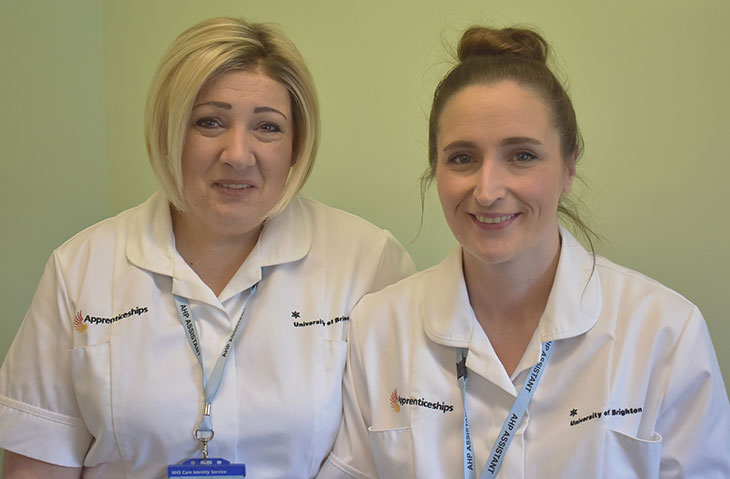During National Apprenticeship week (4th to 8th March 2019), the Physiotherapy service at ESHT have highlighted how they have been benefitting from the apprenticeship scheme to upskill physiotherapy support workers, to enable services to deliver on commitments in the NHS long term plan (LTP).

Assistant Practitioner Apprentices Danielle De Liefde and Nicola Cole
One of the commitments in the LTP is improving access to post-natal physiotherapy for the thousands of women who experience incontinence following childbirth. East Sussex Healthcare NHS Trust is already one step ahead in improving local women’s and men’s health physiotherapy provision, by appointing and developing two support workers with apprenticeships.
Jules Hall, Clinical and Operational Outpatient Physiotherapy Lead said: “Our physiotherapy team reflected critically on patient need and service demand in the women’s and men’s health service. Recognising that capacity to provide essential but arguably routine provision that did not require the level of knowledge and skill of a registered physiotherapist, was frequently being compromised by the need to support the most urgent and complex patients. The team therefore took the decision to appoint and develop two support workers. The successful candidates, Danielle De Liefde and Nicola Cole are undertaking the Assistant Practitioner apprenticeship as part of this innovative approach.”
Following the successful completion of their two year apprenticeship, Danielle and Nicola, will receive a level 5 Foundation Degree. Through a combination of, off the job and work based learning, they have acquired a range of specialist knowledge and skills enabling them to work with a high degree of autonomy with patients presenting with more routine and non-complex problems.
Jules Hall, Clinical and Operational Outpatient Physiotherapy Lead said: “This service transformation will complement our existing provision and critically will free up the physiotherapists to see more patients whose needs can only be met by the knowledge and skills of a registered practitioner. This creative approach to service development ensures our patients see the right clinician with the right knowledge and skill at the right time in their pathway. Crucially for women post childbirth this is as soon as any issues with continence are identified. Expectant mothers in East Sussex can be reassured that improved access to physiotherapy should they need it following childbirth, is firmly in the plans of their local physiotherapy service.”
She added: “Our two apprentices are highly motivated and organised individuals and have already transformed the referral pathway for post-natal women with complications of delivery, and ensure that these women are receiving important information and advice before they go home as well as booking the important first appointment within six weeks.”
